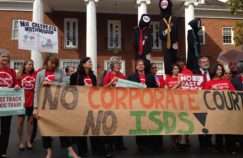Over the last two decades there has been an explosion of regional trade agreements, bilateral investment treaties (BITs), and host-government agreements (HGAs) designed to afford protection to foreign investors and their investments. Likewise, foreign investors have increasingly used investor-to-state dispute settlement to sue host state for damages before unaccountable arbitral tribunals. Many stakeholders are apprehensive about investment rules and arbitration, including environmental groups, labor groups, development organizations, local governments, and more. These concerns stem from the ambiguous or unbalanced character of the rules governing investments, as well as from the democratic deficits apparent in the arbitral mechanism utilized to resolve investment disputes.
As currently designed, the proliferation of BITs and other trade agreements are frustrating the transition towards sustainable development. In many cases, investors have aggressively used investment rules to gain compensation at the expense of local environmental, safety, and human rights laws, rendering local and national democratic institutions unable to protect their citizens from the negative impacts of unsustainable investments. This ability to run roughshod over important public welfare laws is one of the main reasons CIEL is concerned about the investment provisions found in many treaties today. CIEL and many other civil society organizations feel that the far-reaching rights enjoyed by transnational corporations should be reigned in and balanced by rules and specific obligations to encourage better environmental and human rights practices.
Despite the fact that these disputes involve critical public policy issues, civil society and the media are usually shut out from the process. CIEL actively works with its partners to increase transparency and public participation in investor-State disputes, with notable achievements like the submission of amici curiae briefs and the first webcast of an arbitration hearing.















